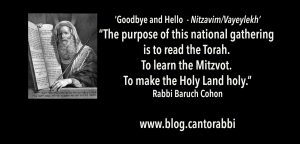GOODBYE and HELLO – Nitzavim/Vayeylekh – Deut. 29-31, by Rabbi Baruch Cohon
Last week’s reading concluded the second of Moses’ Final Discourses and began his third and last public message to the Jewish People. Since we will read two sections this week, we will also read the end of his public orations, and his personal instructions to Joshua who will soon take his place as the people’s leader.
Often we reserve special respect for an elder’s last words. Rightly so, particularly in Moses’ case. Speaking of the Mitzvos – the Commandments that he delivered, of the rewards for following them, and the punishments for violating them that he already predicted quite graphically, he reminds his people:
“This Mitzva that I command you today, it is not too mysterious for you, nor is it far away. It is not in heaven, that you should say: Who will go up in the sky and get it for us and tell it to us so we can do it? And it is not overseas, that you should say: Who will cross the ocean and get it for us and tell it to us so we can do it? For the word is very close to you – in your own mouth and your own heart. Just do it. …
“I call Heaven and Earth to witness against you today! I set before you life and death. Choose life, so that you may live, you and your descendants. Love G-d, listen to His words and cleave to Him, for He is your life and the length of your days, to dwell on the land that G-d swore to Abraham, Isaac and Jacob to give them.”
So the land is part of the blessing. Life, the word of G-d, and the ancestral home. All go together for a nation that observes Mitzvot.
No wonder that in the very next chapter Moses charges Joshua to lead the conquest of the Promised Land with supreme courage, and he pronounces this charge in the presence of all the people.
Then he writes a Sefer Torah – not a quick job, even if the writer is not 120 years old. So maybe he wrote it earlier? But Moses himself wrote it. Now he gives it to the Cohanim to be placed in the Ark with the Tablets of the Law. Allowing 7 years for the war of conquest, he then instructs Joshua and the priests on the Mitzvah of Hak-hel – “Gather the People” – to take place at Succos time. Now we celebrate Simchas Torah that week. But Hak-hel had a different theme. What was it? A victory bash? No, the purpose of this national gathering is to read the Torah. To learn the Mitzvot. To make the Holy Land holy. This gathering is not for the elite, it is for all the people – “the men, the women, the children, and the stranger within your gates. Let them listen and learn, and revere the L-rd your G-d, to guard the words of this Torah and to activate them.”
Facing the end of his life, Moses predicts that his people will go wrong after he is gone. And he calls on his followers to write down the song that he will sing – his last song, a stirring verse of faith, that can bring them away from their error. Next week we will read it.
For now, maybe we should just recall a ditty from the early days of modern Israel:
Eretz Yisrael b’lee Torah,
hee k’guf b’lee n’shamah.
“The land of Israel without the scroll
Is like a body without a soul.”
Just as Moses charged Joshua, we may well remind our people today: Courage and faith go together.



